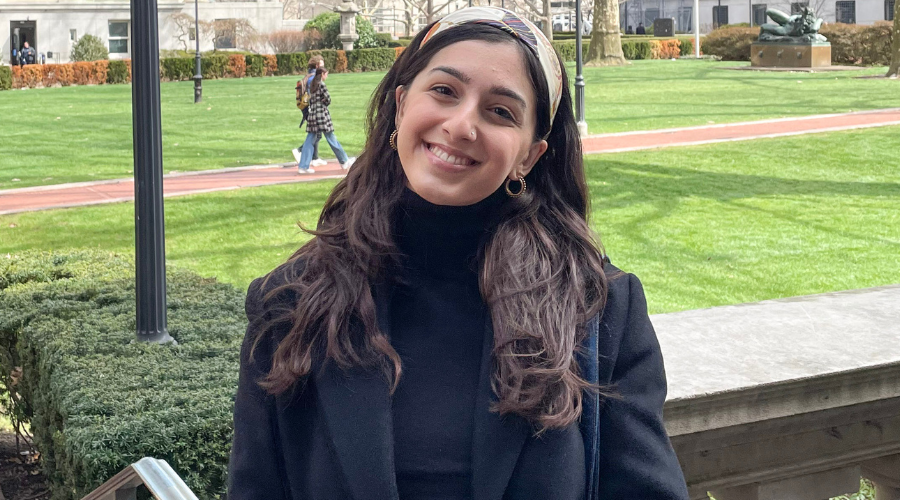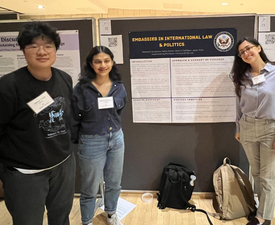Dual BA Student On the Value of Undergraduate Research
Nikka Afshar ‘23GS worked on the research project “Embassies in International Law,” and presented it at the Columbia Undergraduate Research Symposium. She shares the value of this experience, and advice for students wanting to get into research themselves.

At last fall’s Columbia Undergraduate Research Symposium, almost a dozen GS students presented their research projects to peers, mentors, and distinguished guests. Ranging from solo and small team endeavors, from STEM to social sciences and humanities, the Symposium highlighted the diversity of research opportunities available to Columbia undergraduates.
One of the GS symposium participants was Nikka Afshar ‘23GS, a senior who studied political humanities at the Reims campus and is currently majoring in philosophy at Columbia. We recently spoke with her about her Dual BA journey, the process of working on her research project, and the value of research within the undergraduate experience.
Tell us about your journey to the Dual BA Program!
In high school, I was actually considering doing my entire undergraduate degree abroad. However, I wasn’t sure if that was the right choice for me because I knew that ultimately I wanted to pursue graduate education in the U.S. When I heard about the Dual BA, it just made sense. It was a chance to be abroad for more than a semester, but without committing three full years.
Now, I’m so grateful for the independence the program has afforded me. For example, the opportunity to study two completely different subjects: At Sciences Po, I majored in political humanities and at Columbia I am majoring in philosophy. I also have friends who have studied political science at Sciences Po and then a STEM major at Columbia, or similar paths. It’s an amazing opportunity to do different things that then lend themselves to each other.

What was the research project you worked on and how did you get involved?
I had a part-time internship over the summer and I wanted to fill the rest of my time with something worthwhile. I was interested in research because I’d never done research before, so I met with Dean Novarr and spoke with him about my different options. He told me about the Undergraduate Research and Fellowships website, so I went there and looked at the different projects. I saw a few that I found interesting, including the one I ended up working on, and applied.
This particular project, “Embassies in International Law,” interested me because of the law and international relations elements. I also liked our advisor, Dr. Christian De Vos (Department of Political Science and the Institute for the Study of Human Rights), immediately, and knew he was someone I’d work really well with. Together with two other undergraduate students (Meeral Tashfeen ’25CC and Jason Trinh '23GS), we looked at the role of embassies in different world regions. The project revolved around thinking about how embassies are historically known as sites of sanctuary, but also secrecy and conflict, and they are places with special legal protections. I focused on Iran, and used the hostage crisis as a case study to look at the difficulties associated with holding Western embassies accountable for their violations of domestic and international law during a crisis like that. I feel I didn't have time to delve into it as much as it deserves and needs, but it was such an interesting project.
Why did you want to pursue a research opportunity? How has it enriched your undergraduate experience?
It was always something I’d wanted to do, especially to try out research in more of a professional capacity outside of just researching for a paper. I wanted to see how I liked it in terms of post-grad plans and job prospects. I felt it ended up being a really rewarding use of my time, and I enjoyed the freedom we were given in the project. It was great to explore this idea that our advisor had given us but then be able to engage with it in a way relating to my interests.
"Everyone at GS is rooting for you and wants you to follow your passions and do well."
What advice would you have for other students interested in research experiences?
Take advantage of the facilities and opportunities that Columbia gives you, especially the faculty and advisors at GS. After you’ve decided you want to do research, the hardest part can be figuring out what to do next, where to start, and how to narrow down options. So, reach out: everyone at GS is rooting for you and wants you to follow your passions and do well.
